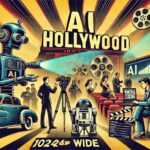Introduction: When Machines Dream Stories
In 2025, screenwriters aren’t the only ones pitching ideas in Hollywood. Artificial intelligence is generating plotlines, writing dialogue, and even imagining entire screenplays with surreal speed and uncanny accuracy. One tool leading this creative revolution is the Perchance AI story generator—a platform that empowers users to craft stories with a single click, drawing from massive language models to spit out everything from fantasy sagas to sci-fi thrillers.
But with this new frontier comes controversy. Who owns the content produced by an AI? Can studios legally turn AI-generated scripts into blockbusters? And what happens when these tools are used to imitate the voices or likenesses of real celebrities?
The Perchance AI story generator is more than just a fun writing assistant—it’s a flashpoint in the battle over intellectual property, creative rights, and the soul of storytelling in the age of machines.
Why AI Raises New Copyright Challenges
When humans create a script, there’s no question—copyright belongs to the writer. But when AI generates a scene, a character, or an entire screenplay, the legal waters turn murky. The Perchance AI story generator, like other AI writing tools, doesn’t truly “create” in the human sense. Instead, it synthesizes content from a pre-trained database built on countless works of fiction, news, dialogue, and online chatter.
The Problem of Originality
Copyright law is based on the principle of originality and human authorship. But AI doesn’t have consciousness, intention, or emotion. This raises key questions:
- Is AI-generated content considered original?
- Can a user claim authorship of content created via tools like the Perchance AI story generator?
- What rights do developers of AI tools have over the content their systems produce?
The U.S. Copyright Office has been clear so far: only works created by human beings are eligible for copyright protection. This makes AI-generated scripts legally unprotected unless heavily edited or rewritten by a human author.
The Gray Zone
Let’s say a screenwriter uses the Perchance AI story generator to develop a sci-fi plot. They tweak a few lines, rewrite the dialogue, and pitch it to a studio. Is that now a human-authored script? Or is it partially owned by the AI developers?
This legal gray zone is why many studios are cautious about fully embracing AI-written screenplays without legal safeguards in place.
Ownership of AI-Generated Scripts and Images
Ownership disputes are becoming increasingly common in the world of AI-assisted creativity. If you generate a story using the Perchance AI story generator, do you own it? Can someone else use the same prompt and claim a similar story?
The Role of Terms of Service
The answer often lies in the fine print. Most AI platforms (including Perchance) include disclaimers stating that generated content may not be wholly original and may resemble other outputs. Some even claim partial ownership or license rights over the generated works.
This complicates things for creators hoping to commercialize AI-generated stories or characters.
Visual Content and Copyright
It’s not just text-based outputs causing headaches. AI image generators—like Midjourney or DALL·E—allow users to create realistic visuals, concept art, or even likenesses of real actors. When combined with the Perchance AI story generator, these tools offer a full-stack creative solution: story, visuals, and even AI-generated trailers.
But who owns those images? And what happens if they closely resemble a copyrighted work or living person?
Deepfakes and Intellectual Property: Where Imagination Gets Dangerous
AI doesn’t just generate new stories—it can recreate old ones, or even invent false ones using deepfake technology. This has opened a Pandora’s box of ethical and legal concerns in Hollywood.
Synthetic Voices and Faces
Using AI to replicate the voice of Morgan Freeman or the face of Marilyn Monroe isn’t science fiction—it’s real, and often shockingly realistic. Combine that with the Perchance AI story generator, and you can create fictional movies starring people who never agreed to appear in them.
This raises several problems:
- Right of Publicity: Celebrities have the right to control how their name, image, and voice are used commercially.
- Consent and Compensation: If an AI uses a deepfake of a deceased actor, who gets paid? Their estate? The developer of the AI?
- Reputation Risk: What if a deepfake places an actor in a controversial or offensive context?
AI Meets Misinformation
Beyond the entertainment world, deepfake stories and visuals can be used to spread misinformation. A fake video featuring a political figure or a fabricated “leak” from a movie set can easily be generated with tools like the Perchance AI story generator and accompanying video software.
This makes the conversation about AI ethics not just a creative issue, but a public safety one.
Real Legal Battles: The Scarlett Johansson Case and Beyond
In 2023, a viral video circulated online featuring what appeared to be Scarlett Johansson promoting a skincare brand. The catch? She never filmed it. Her voice and likeness were recreated using AI—without her permission.
Johansson’s Legal Response
Scarlett Johansson took legal action, citing unauthorized use of her voice and image. The creators of the ad claimed it was AI-generated content meant as “parody,” but the court didn’t buy it. The case became a landmark example of how AI-generated media can cross legal boundaries.
Why It Matters
This case set a precedent that AI-generated deepfakes using a person’s likeness without consent can result in real legal consequences. It also prompted some states to introduce legislation around synthetic media, including required disclosures for AI-generated content.
For platforms like the Perchance AI story generator, this has implications. Even if the tool is primarily text-based, pairing its outputs with visual and audio deepfakes creates a full media experience—one that might breach legal limits if used irresponsibly.
The Future of AI Rights in Hollywood
With rapid AI adoption, the industry must wrestle with some big questions:
- Should AI-generated scripts be eligible for awards?
- Should developers of tools like the Perchance AI story generator receive royalties?
- Should studios disclose when a movie was partially AI-generated?
Guilds and Unions Take a Stand
Organizations like the Writers Guild of America (WGA) and Screen Actors Guild (SAG-AFTRA) are already addressing these issues. In recent negotiations, they pushed for:
- Clear guidelines on how AI-generated material is credited.
- Protection against replacing human jobs with AI.
- Compensation structures for actors whose voices or likenesses are cloned.
As the lines between human and machine creativity blur, these unions aim to ensure that technology supports—not supplants—human artistry.
AI for Good: Creative Tools, Not Replacements
Despite all the controversy, many creators see the Perchance AI story generator as a valuable ally. It’s a powerful brainstorming partner, helping overcome writer’s block, exploring alternate plot paths, and even generating humorous ideas for social media or short films.
How Creators Are Using AI Ethically
- Storyboarding: Writers use Perchance to visualize alternate endings or “what if” scenarios.
- Character Design: AI helps build complex characters by suggesting backstories and personality traits.
- Dialogue Drafting: It can generate placeholder dialogue that writers later humanize and refine.
In this light, AI is a co-creator—an assistant, not an author. As long as credit and compensation remain clear, many believe AI can enhance creativity, not stifle it.
Conclusion: Redefining Authorship in the Age of AI
The Perchance AI story generator is more than just a cool app—it’s a symbol of a broader shift in how we tell stories, assign credit, and protect intellectual property in the digital age. As AI becomes embedded in every stage of content creation, the entertainment industry must adapt its legal, ethical, and creative frameworks.
Yes, there are challenges—ownership disputes, deepfake scandals, and blurred lines between inspiration and imitation. But there are also incredible opportunities. AI can democratize storytelling, empower underrepresented voices, and supercharge creativity in ways we never imagined.
The future of Hollywood won’t be fully written by humans or machines—it will be co-written, negotiated, and reshaped in real time. And tools like the Perchance AI story generator will play a defining role in that next act. Also read AI for Data Analysis in Hollywood.





